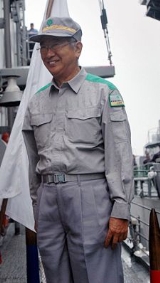
ese author, actor, politician and the governor of Tokyo
since 1999.
Shintarō was born in Suma-ku
, Kobe
. His father Kiyoshi was an employee, later a general manager, of a shipping company. Shintarō grew up in Zushi
. In 1952, he entered Hitotsubashi University
, and graduated in 1956.
Just two months before graduation, Shintarō won the Akutagawa Prize
(Japan's most prestigious literary prize) for the novel . His brother Yujiro
played a supporting role in the screen adaptation of the novel, and the two soon became the center of a youth-oriented cult.
In the early 1960s, he concentrated on writing, including plays, novels, and a musical version of Treasure Island
.
Regarding the Rape of Nanjing: "They say we made a holocaust there, but that is not true. It is a lie made up by the Chinese."![]()
About himself: "I’m an existentialist--freedom and passion are the most important things to me. I was horribly disappointed when I learned that Sartre was a Communist."![]()
On political parties: "A party is a political tool. If it's no longer useful, it should be crumpled up and thrown away."![]()
On the status of politicians in Japan: "in Japan people avoid going into politics. I was really looked down on in literary circles [when I went into politics]."![]()
About the United States: "Fifty years of subservience to the interest of the United States has deprived the Japanese of a national purpose and engendered a paralyzing identity crisis." [After all, Japan] "is the only non-Caucasian society to have created a modern superpower."![]()
In response to China's first successful launch of a man in space: "The Chinese are ignorant, so they are overjoyed. That spacecraft was an outdated one. If Japan wanted to do it, we could do it in one year."![]()
“Let them bomb Japan with that nasty missile. Their missile cannot load a nuclear warhead.”
![]()
Regarding the bomb-planting at the private residence of Deputy Foreign Minister Hitoshi Tanaka: "A bomb was planted there. I think it was deserved."![]()

